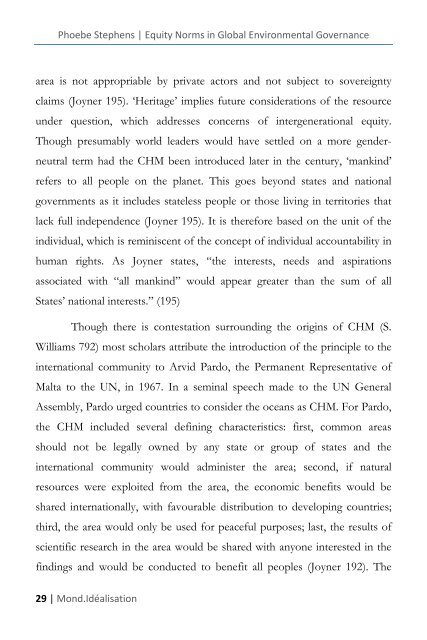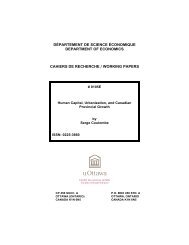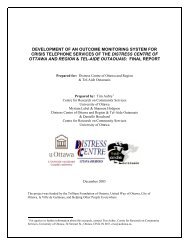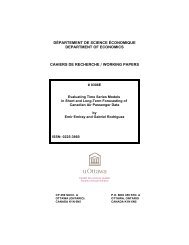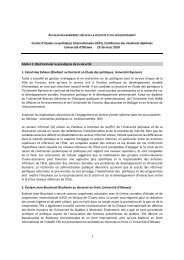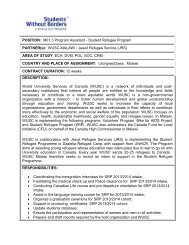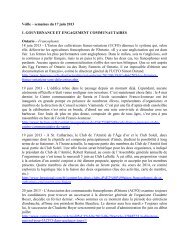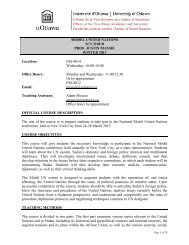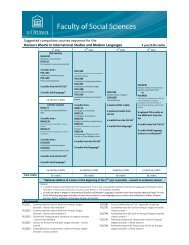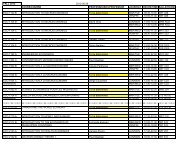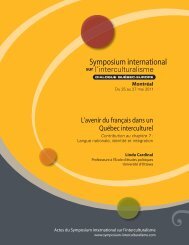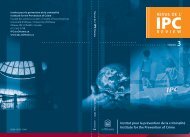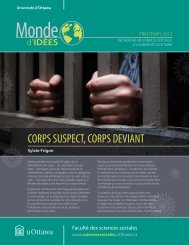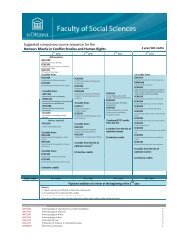GLOB.IDEALIZATION MOND.IDÉALISATION - Faculty of Social ...
GLOB.IDEALIZATION MOND.IDÉALISATION - Faculty of Social ...
GLOB.IDEALIZATION MOND.IDÉALISATION - Faculty of Social ...
Create successful ePaper yourself
Turn your PDF publications into a flip-book with our unique Google optimized e-Paper software.
Phoebe Stephens | Equity Norms in Global Environmental Governance<br />
area is not appropriable by private actors and not subject to sovereignty<br />
claims (Joyner 195). ‘Heritage’ implies future considerations <strong>of</strong> the resource<br />
under question, which addresses concerns <strong>of</strong> intergenerational equity.<br />
Though presumably world leaders would have settled on a more genderneutral<br />
term had the CHM been introduced later in the century, ‘mankind’<br />
refers to all people on the planet. This goes beyond states and national<br />
governments as it includes stateless people or those living in territories that<br />
lack full independence (Joyner 195). It is therefore based on the unit <strong>of</strong> the<br />
individual, which is reminiscent <strong>of</strong> the concept <strong>of</strong> individual accountability in<br />
human rights. As Joyner states, “the interests, needs and aspirations<br />
associated with “all mankind” would appear greater than the sum <strong>of</strong> all<br />
States’ national interests.” (195)<br />
Though there is contestation surrounding the origins <strong>of</strong> CHM (S.<br />
Williams 792) most scholars attribute the introduction <strong>of</strong> the principle to the<br />
international community to Arvid Pardo, the Permanent Representative <strong>of</strong><br />
Malta to the UN, in 1967. In a seminal speech made to the UN General<br />
Assembly, Pardo urged countries to consider the oceans as CHM. For Pardo,<br />
the CHM included several defining characteristics: first, common areas<br />
should not be legally owned by any state or group <strong>of</strong> states and the<br />
international community would administer the area; second, if natural<br />
resources were exploited from the area, the economic benefits would be<br />
shared internationally, with favourable distribution to developing countries;<br />
third, the area would only be used for peaceful purposes; last, the results <strong>of</strong><br />
scientific research in the area would be shared with anyone interested in the<br />
findings and would be conducted to benefit all peoples (Joyner 192). The<br />
29 | Mond.Idéalisation


